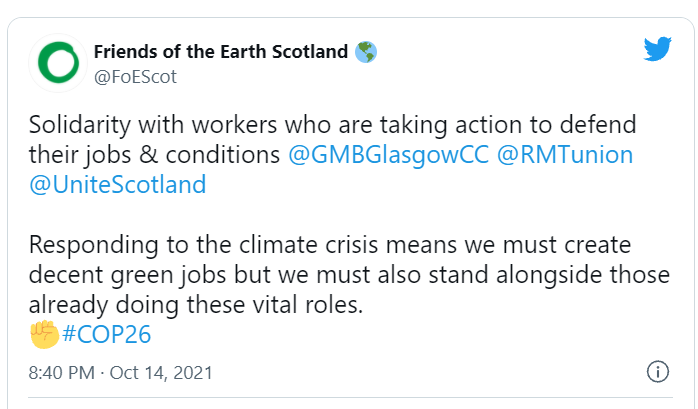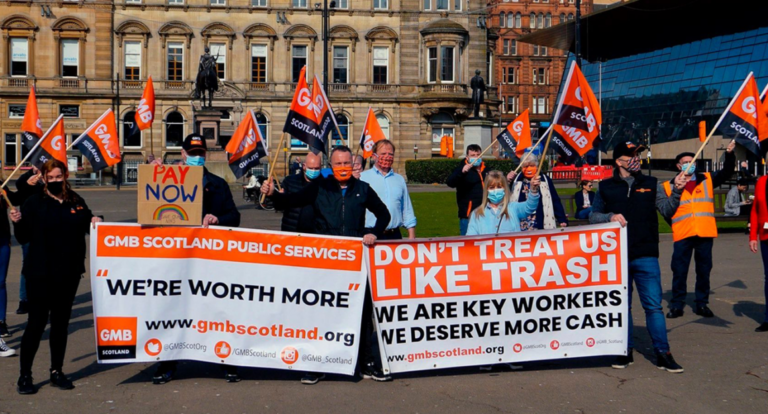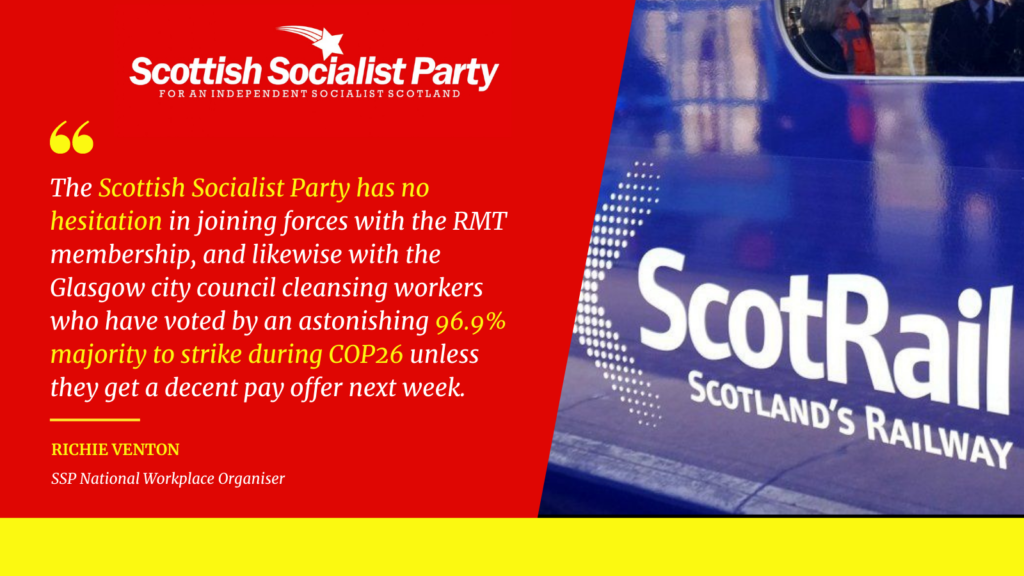Scottish trade union members in two unions – RMT members on ScotRail and the Caledonian Sleeper, and GMB members in Glasgow City Council – have voted overwhelmingly to strike during COP26 in November. Industrial action is also likely at the Stagecoach bus company by Unite the Union members.
Further strikes threatened on ScotRail network
84% of the 2,000 members of the RMT working on ScotRail voted to hold strike action across Scotland over a pay claim. The strikes could be held during the COP26 in Glasgow from 1-11 November when transport systems will already be under severe pressure.
The dispute has provoked the SNP government transport minister, Graeme Dey, into trying to challenge the RMT union and the legitimacy of the ballot vote. In an interview on BBC Radio Scotland, Dey claimed the dispute was ‘no longer valid’ as a new pay offer had been made. ScotRail had announced after the ballot had commenced that they would make a miserly two year 4.7% pay offer. This is likely to be well below inflation rates, given the current Tory cost-of-living crisis across Britain with soaring energy costs and road haulage distribution problems, caused in part by skilled labour shortages because of the Tory pursuit of Brexit at all costs. The Tories are desperately trying to apply sticking plaster to the damage done to the road haulage industriy by the exclusion of EU workers from the Labour force – it doesn’t seem to have occured to them to expand rail freight as an alternative to diesel lorries clogging up the roads. The below inflation pay offer from ScotRail was also coupled with major reductions in working conditions and standards. The RMT has responded by ridiculing the offer and demanding that the Scottish government get round the table with ScotRail and the RMT to put forward a reasonable offer.
RMT Scotland organiser Michael Hogg, a former miner, said it was a “lousy, rotten offer” of a 4.7% increase [over two years] which was not worthy of consideration because it required “members to sell hard-earned terms and conditions in order to get a pay rise”
ScotRail has been in dispute with the RMT for many months over conductor and ticket examiner conditions and pay and the RMT have recently been holding strikes on Sundays which has shut much of the network down. Senior figures in the SNP government have already disgraced themselves by trying to claim that the dispute is being manipulated by the RMT leadership in London, despite the fact that the disputes are led by the Scottish leadership of the union and repeatedly supported by rank and file membership in legal ballots. In fact the RMT is one of the few unions in Britain that actually supports the core SNP policy of Scottish Independence and the union called for a vote ‘Yes’ in the 2014 referendum. The RMT was also disaffiliated by the Labour Party in 2004 after its Scottish section agreed to support and affiliate to the Scottish Socialist Party, a pro independence party standing against Scottish Labour.
A key issue in the framing of the Scottish government’s anti-union response to the current dispute will be the attitude taken by the SNP’s recent junior governmental partner, the Scottish Green Party. The Scottish Green Party currently support the SNP government in parliament and have two junior governmental ministers including part of the Transport brief.
The Scottish Green Party Trade Union Group immediately issued a statement saying:
“Abellio and Serco have let the railways down. Their intransigence has cost Scotland most Sunday services and now travel during COP26. As lay members and trade unionists we support the RMT, a shining example of leverage, and urge the employers to make a genuine worthy offer.” Scottish Green Party Trade Union Group
This statement has been retweeted by ecosocialist Scottish Green MSP Maggie Chapman, who had also issued a statement after the SNP attacked the ‘London-based’ RMT with the single word “Solidarity!” in support of the RMT action.
Friends of the Earth Scotland, one of the main environment organisations backing the COP26 Coalition demonstrations and events in Glasgow during the COP also tweeted solidarity with the latest workers’ actions, demonstrating the importance of solidarity between the union and environmental movements built in the recent period.

ScotRail is the main rail service across Scotland and is currently run by a private company, Abellio. Under Britain’s privatised and fragmented rail system, private train operators are awarded contracts, called ‘franchises’, under rules enacted by the Tory UK government – 13 years of UK Labour government 1997-2010 under Tony Blair and Gordon Brown failed to change the privatised system however. The Scottish government, led by the SNP with an agreement with the Scottish Green Party, subsidises the costs of the franchise. The Scottish government has some legal powers over the franchise and after much prevarication over poor performance from Abellio finally called time on the franchise by announcing that the government would take over the running of the network from March 2022. This was a big climbdown by the SNP who claim to be social democratic and who repeatedly claimed in the face of demands from the left wing RMT that they did not have the power to nationalise the network. But this hollow claim was exposed when the Welsh Labour-led devolved government nationalised and took over part of the network in Wales last year. However since the announcement that the Scottish government would take over, Abellio announced big cuts to the network services from December leading to protests from all the rail unions and passenger campaign groups.
Caledonian Sleeper dispute
RMT members on the Caledonian Sleeper service have also voted overwhelmingly to strike over pay during COP26. The Caledonian Sleeper is a separate privatised rail franchise for an overnight service between Scotland and London and is currently operated by the SERCO group. SERCO is a private sector outsourcing company run by a Tory grandee with strong links with the UK Tory party and government. It is notorious for getting contracts underhand from the Tory government at Westminster, most notably for the lamentable ‘Test and Trace’ privatised testing system set up in response to the Covid pandemic and ridiculously given ‘NHS’ branding by the Tory UK government when it has nothing to do with the state-run NHS systems. RMT has previously held strikes and been in dispute with SERCO over their failure to create safe workplace conditions during the pandemic, ironic given the parent companies propensity to seek billions in contracts from the UK government for public health functions that should have been undertaken by the state.
Glasgow bin and school workers vote to strike – Council heads for crisis
In addition to the likely RMT strikes, Glasgow City Council bin and school workers in the GMB trade union have also voted overwhelmingly to strike over a pay claim during the COP26.
The pay offer had been put forward by the umbrella body representing Scotland’s 32 councils – COSLA, the Convention of Scottish Local Authorities – and there are a number of ongoing strike ballots among various unions in council workforces across the country.
GMB members in Glasgow City Council represent 900 bin workers and 600 school support staff. They voted by a magnificent 96.9% to reject the pay offer and support strike action during the COP26. This could mean widespread school closures and bins unemptied across the city as it welcomes tens of thousands to the city.

COSLA say their hands are tied by the lack of funding from the Scottish government, which has found money to pay NHS key workers more. The GMB rightly argue that their members were also key workers during the pandemic and deserve better pay.
There will be severe pressure on the minority SNP leadership of Glasgow City Council to demand more money is put on the table by COSLA. The seven Scottish Green Party councillors can take the lead in demanding support for council workers and unions. Scottish Labour are also likely to challenge, cynically, the SNP government to solve the crisis. But Scottish Labour have long been part of the problem. Glasgow City Council is Scotland’s largest council by far and was under Labour control for over 40 years until 2017, overseeing cuts in services and discriminatory pay systems that eventually resulted in a massive equal pay payout after the Council was found guilty in the courts. The court decision and the subsequent payout costs in the equal pay case against the previous Labour council was a massive victory for women workers, who had been discriminated against by Labour for decades. But the one billion pound cost of the settlement is costing the council dearly, particularly in the faltering system of grant funding coming from the Scottish government and the failings of the 30 year old Council Tax system leading to cuts in services.
Proposed cuts in Glasgow City Council services are threatening the closure of community centres and local libraries. They have been challenged by a new community and trade union campaign – ‘Glasgow Against Closures’ which has held marches and protests across the city, the next taking place on Saturday 16th October (12.30 Buchanan Galleries). Local council elections take place across Scotland in May 2022 and there is already talk about anti-cuts and socialist candidates challenging the SNP government and local administrations.
It’s not good enough for the SNP government to blame UK government funding to Scotland. The SNP at local and national level need to get behind the council and other public workers, and offer solidarity in challenging the UK government to prioritise public services. However, the signs are that the UK Chancellor’s public expenditure Budget and Spending Review statement on 27 October is set to unleash massive cuts. Analysis by the Institute for Fiscal Studies and others shows that given the costs of the privatised response to the pandemic, increased Defence, NHS and school spending, all other public services in all parts of the UK are likely to see budgets slashed as the millionaire Tory government unleashes another wave of austerity cuts. It will take a massive defence campaign across the labour movement and communities to resist these cuts in Scotland, and elsewhere in the UK.
The Scottish Socialist Party National Workplace Organiser has offered the solidarity of his party to the workers in dispute.

Republished from ecosocialist.scot
Art Book Review Books Campism Capitalism China Climate Emergency Conservative Government Conservative Party COVID-19 Creeping Fascism Economics EcoSocialism Elections Europe Far-Right Fascism Film Film Review Fourth International France Gaza History Imperialism Iran Israel Italy Keir Starmer Labour Party Long Read Marxism Marxist Theory Migrants Palestine pandemic Protest Review Russia Solidarity Statement Trade Unionism Ukraine United States of America War Women

